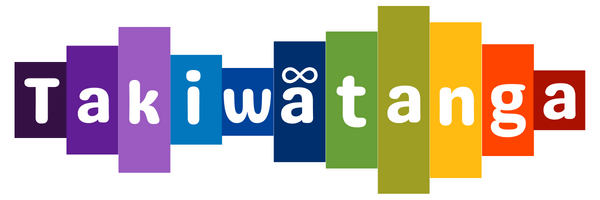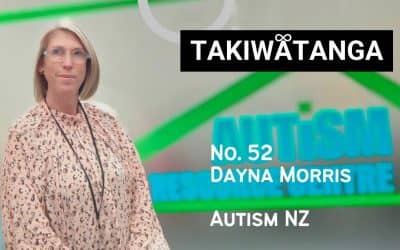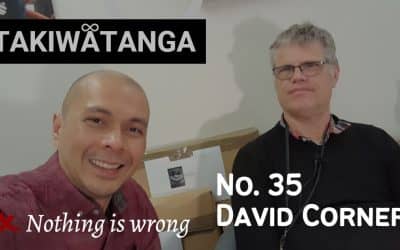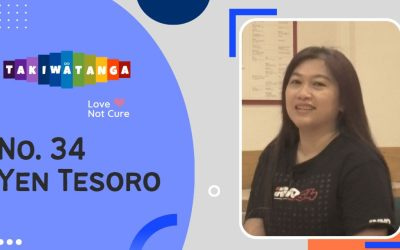With Tania Thomas from IHC – Idea Services
Transcript:
[00:01:26.760] – Lloyd:
We’re here in IHC, and we’re here with us today, Tania Thomas, and she is the Director of Advocacy for IHC. And today she will be sharing some of the insights about IHC and their services programs and how we can avail their programs. Welcome, Tania. First and foremost, I would like to thank you for your time. And I know this is your lunchtime and it’s such a short notice for you. Thank you for giving us your time.
[00:02:00.340] – Tania:
You’re most welcome.
[00:02:03.620] – Lloyd:
Before anything else, tell us about yourself.
[00:02:07.240] – Tania:
I’m a grandmother and a mother. I hailed from the far north and just outside of Kairtire in Northland. I’m Ngarit Kahu on my dad’s side and on my mum’s side, I’m Scottish and N’ati Mahurihune. I grew up in South Auckland and I’ve worked in the disability sector for 40 years. That’s a long time. That’s a long time.
[00:02:36.910] – Lloyd:
Given that time, what makes you think, or what gives you the strength to carry on and day to day go to organisations like IHC or IDS services.
[00:02:49.340] – Tania:
I really think it’s important that everyone is included in our community and that everyone who has rights everyone has rights and they should be upheld. I strongly believe in people standing up, speaking up, and having their rights met and achieved. For me, that’s something that’s a force within me, and it’s probably the way I was brought up as well. For me, it’s important to work with people that have similar values and want to achieve similar things. I have always worked in organisations, which it’s always been sad for me to leave them. But life happens and your circumstances change, but I’ve never left the disability sector. For me, I’ve made lifelong friends here. I’ve had really rewarding work. That’s why I’m here.
[00:03:52.170] – Lloyd:
Tell us about the IHC., your services and programs, and how our out there can available services for them?
[00:04:04.630] – Tania:
I’ll start by saying that IHC. is a group of companies. I work for IHC, and in the company I work within, we have the fundraising team, we have the volunteer service, we have I volunteer where people can sign up to have a volunteer as a friend, meet somebody that has got similar interests with them.
We have family liaison people who work alongside families, supporting them through whatever they might be going through, where they need a little bit of help, somebody to just walk alongside them and say, We could sort this out. We have family liaison. We have a fantastic library service, and that library service is available to all people in New Zealand.
You can get books out, you can ask for journals, and it’s all to do with disability and largely to do with intellectual disability or neurodiversity. Also in that team in the IHC group that I’m in is the events. We’ve just had the IHC. Art Awards, where people from all around the country have put in artwork to be judged and sold. The money goes directly to the artists. That’s the area I work in. Another company that’s under the IHC group is idea services.
[00:05:38.120] – Tania:
That’s probably the one that most people know about. That is the one that we provide residential support services for people with intellectual disabilities. They may have other impairments. They may have mental health conditions. They’re all around the country, those residential service homes, and we have supported independent living.
All of those services are aimed at people having the best opportunity to live the life they want to live. Everything through ideas services and the IHC group is about people having more choice and control over their own lives and being able to decide and choose what they’d like to do on a daily basis, to be doing everyday things with everyday people and everyday places.
Everything in ideas services is geared towards being respectful and upholding the dignity of people to live the life they choose and that they aspire to have. The other service is, or the other company is choice and community living and that’s where people live in their own flats or homes or apartments and our support staff go to them for however many hours a week to support them at home.
We provide accessible housing through another part of the IHC group and that’s making sure that we have affordable housing for people and accessible housing so that if you’re a wheelchair user or if you’re prone to poor mobility or something like that, that there’s a home in a place that will fit you.
[00:07:41.150] – Tania:
My job in this service under IHC is to make sure that inclusion and community is the key and that I remind anyone who wants to listen or who doesn’t want to listen about the importance of respecting diversity. There’s so many different ways of being and people and things to do.
We’re better off when we have a group of people that have got all different skills and all different needs. And inclusion is about, again, doing everyday things with everyday people in everyday places. I spend a lot of time looking to see what systems need to be changed so that people can be more included and that their rights are upheld.
[00:08:37.200] – Lloyd:
Then this is gearing towards across Aotearoa’s vision of equity. I know now I’ve learned that IHC is a group of companies, but is there a way for us to understand how many families are we supporting?
[00:08:54.990] – Tania:
I think it’s around three and a half thousand. It’s one of the biggest disability support organisations in the country. We’ve been in existence for 76 years, and we were set up and started by families who felt that there wasn’t a good enough support in New Zealand for their child.
They banded together and they set up IHC. That legacy, here we are, 76 years later, and we’re a membership organization, so families have a big role to play in the work that we do and how we do our work.
[00:09:40.070] – Lloyd:
That’s across the country and that’s a mixture of different disabilities, right? We have autism or we have…
[00:09:48.070] – Tania:
They’re all people who have an intellectual disability, but they may have other, but their main…
[00:09:59.040] – Lloyd:
So the main is more on the intellectual. Okay. So are we funded by the government or is there any support coming from the government, like Minister of Health or Health New Zealand or Minister of Education?
[00:10:16.530] – Tania:
We largely are funded by the government, and I would mention here that we are underfunded. The reason that we do fundraising is so that we can provide services that we think people should have and services that people want to have because the government, their funding is inadequate.
[00:10:42.660] – Lloyd:
That’s the common thing that I’ve spoken to. I had a chance to speak to HVRD, Hutt Valley Riding for Disabled, and the same thing as well. I had a chance to speak with the CEO of Autism NZ, and the same thing as well. What do you think should be the approach in terms of getting the right funding for our Whanau who have disability in their family?
[00:11:10.630] – Tania:
One of the things that excited me to join this role because I’ve only been in it for three months, three and a half months, was the introduction of Whaikaha, the Ministry of Disabled People. I saw a real opportunity for disability not to be seen as a sickness and that we could have an opportunity to fight harder with the government to get funding specifically for disabled people, not as an add on to the Ministry of Health.
The other exciting thing for me, which is more opportunity is, Te Aka, whare order, which is the Maori Health Authority, they are looking very much around what’s needed for Ma ree, and how could we commission or contract services that are for Maori by Maori. What models will work for Maori, I think that’s exciting that we have that opportunity. We can all learn from that. How we get more funding…
Sometimes it’s not always about more funding, it’s about doing things differently. What we do know is that after COVID, or when we were two years ago, all disability support organisations suddenly realised how important it was to become digitally fluid, if that’s the word.
[00:12:52.800] – Tania:
In the service that I managed before coming here, we put tablets in all the residential homes, and that was the way that the people we supported could talk to their family and their whanau using the tablets. And we thought, why didn’t we do that before COVID? Because sometimes when things change very quickly or there’s a crisis, you then start to think differently about,
We can’t keep doing things the same way we’ve always done them. So actually, in lots of ways, as terrible as COVID has been, it has actually opened the door to thinking differently about how do we do this? Some of the ways we do it might actually save money and still be a good way.
[00:13:55.930] – Lloyd:
So what support is that when we have those electronic devices at home? Is it more on communication with IHC. or the services and things like that?
[00:14:08.650] – Tania:
It’s more about people being connected with each other. So for example, we have just started webinars across… Now, we have 600 residential homes within Idea Services. And last Friday, I think it was, they had online drumming. People who live in the residential homes or who are in supported, independent living can get online and can go through a drumming session. People who have been in services for a long time often know people in other houses because they may have been flatmates before. So you can see people shouting out, oh, hi, how are you? So it opens the way to actually connect people more and connect groups of people better.
[00:15:09.970] – Lloyd:
And it helps with our mental health as well, because we’re so social and we need to connect more.
[00:15:17.550] – Tania:
To other people. Yeah, we do. But we also need to have fun. And our days need to be filled with meaningful things.
[00:15:26.940] – Lloyd:
Yeah. Oh, that’s amazing. That’s why I put up this podcast as well. Now I am aware that those things are happening. I was never aware about that. People getting social in terms of playing drums together electronically. I never knew that that’s happening. So at least now I’m aware so I can.
[00:15:50.020] – Tania:
Share that. And you can do it. The drumming is, for example, some houses have got upturned buckets, some houses have got pots. It’s about using what you have. It doesn’t have to cost money. Right. I get what.
[00:16:04.690] – Lloyd:
You mean. Right. I’m having fun. Yeah, having fun. About what you have, right? Regardless of the condition. So we did talk about the COVID, which is amazing. And given the change in the health sector, usually we had this, the HBCs now we have Health New Zealand and the Maori Health Authority. How do you think that will affect IHC? And what benefit do you think we can have given that separation? Sorry, should I call it separation? Should I call it separation? I might be using a different terminology.
[00:16:41.350] – Tania:
No, I think, for example, I would be really hoping that the opportunity this raises is that we might start getting better data and better information being collected about disabled people. Because the census survey for disabled people is every 10 years. A lot can happen in 10 years. That’s a long time. That’s a long time. I think when you’ve got a ministry like Whaikaha whose focus is solely on disability, they don’t have to worry about the health side of it.
That’s dealt with by Health New Zealand. Maybe they’ll start thinking, we need better information because planning, resourcing, you need information. That to me is something I think is going to be a plus. I think there’s also a push to strengthen the voice of people with disabilities and their whanau So I’m really hoping that there’s representation of disabled people at all levels of Whaikaha. Ideally, it should be at all levels of everywhere. Local government and service organisations.
[00:18:07.950] – Tania:
How can you provide good support and good services for your community if you only talk to some of the community and not all of the community? I think there’s going to be a chance to have a better voice, a stronger voice for people who are disabled and their families. These are all things that I’m optimistic about.
And we should be optimistic. And I want to support them. I want that to happen. It won’t stop me from being critical. But I hope that it’s constructive. There’s nothing worse than being continually berated because it doesn’t work. It’s not good enough. Actually, you have to come with some solutions. And where do you get those? You get those from talking to the families and to the people who use the service.
[00:19:04.550] – Lloyd:
The last time I’ve spoken to Minister Poto, I was fortunate to get some time of her when the new ministry has started. And she did mention about having more disabled people at leadership roles like Parliament, which is for me, it’s a big thing as well because we can support not just those who are not disabled, but we can support any type of human being. And for me, that’s a super amazing thing that has happened for or out of your own. I agree.
[00:19:46.590] – Lloyd:
With you. Yeah. All right. So how can different families get to your programs and any special application forms that they need to fill out or any contact information?
[00:19:58.520] – Tania:
Well, I think family liaison people are very good people to contact. I have got an email address which is for my team, and that’s [email protected]. We also have an 0800 number, 0800442442. Now, once you get into those connections, then we can decide where best for you to go to get the help or the support that you need.
But you should also be able to get support from a local NASC, Needs Assessment Coordination Service, that should be able to provide you some assistance. The other thing that we do have is we have a IHC he supports a parents group, which is an online group called Afe Ngar M atua, which is help parents. And that is… Anybody can go online there and contact each other and share good ideas, share experiences, those sorts of things
[00:21:33.250] – Lloyd:
So this is anyone can contact those.
[00:21:36.420] – Tania:
Anyone can contact those. I think if you’re a family that are having some difficulties with a service, that it’s a good idea to call the Health and Disability Commissioner’s advocacy service, which is free, it’s independent. Those are advocates that can walk alongside families or anyone who have got concerns or problems with a health or disability service that they’re receiving. Often it’s just miscommunication.
Talk about it. And that number is 0800 112233. So I think sometimes things don’t always work out the way you had planned. But the best thing to do is try and get some help to sort it out and resolve it.
[00:22:31.380] – Lloyd:
And then your team, if, let’s say, you did mention about housing, if there are questions or concerns about housing, they can always contact your team, right?
[00:22:40.280] – Tania:
Yeah. And we will make sure you’re connected to the right.
[00:22:45.460] – Lloyd:
So what is autism in the eyes of Tania? I know this might be a little off the question that I should be asking, but…
[00:22:55.220] – Tania:
What is autism through my eyes? I really love the Maori l translation of what autism is, which is his or her or their own space and time. I think all it says to me is autism is about a different perspective on life, a different way of thinking, a different way of doing, a different way of connecting. There’s a huge range of that because autism is on a spectrum.
There’s as much difference there as there is anywhere in any people. For me, I don’t really think about it. I just think, Oh, people are in their own space and time, and we might have to communicate a bit differently. But I’m sure we can find a way. And if we can’t, we just keep trying. Right.
[00:24:02.540] – Lloyd:
I like that. As long as we keep on trying. And at the end of the day, we’re still successful. Right. So regarding the Art Awards, is this being done internally by those people you are providing services?
[00:24:18.290] – Tania:
No, it’s for anyone in New Zealand.
[00:24:22.390] – Lloyd:
And then they can just join in that Art Award and they can share their talent. And then any monetary… I mean, if you sold those artworks, it would be going.
[00:24:34.650] – Tania:
Directly to the artist because those awards are sponsored. And that means that we don’t take any of the money that… The sold art, we don’t have any of that money that we have to use for the administration. That goes straight to the artist. And often people will pay a lot more than the price that’s put on the wall with the art. It’s some fabulous artwork. I’m happy to show you some of the artwork around the office.
[00:25:10.330] – Lloyd:
I’m going to be stoked when I see those artworks. I love seeing artworks and things like that. You can see how different people have different perspective of the world.
[00:25:21.720] – Tania:
We currently have a photography competition on as well where people are asked to photograph something that’s meaningful to them. So we’ve got a photo competition. Our website as well,ihc. Org. Nz, has got so much information on it. It has all sorts of toolkits, how to be a supporter, how to do advocacy. It’s got all the events on there.
So I can say that it’s a really good resource. And we’re just starting to… We’re going to be launching… Oh, no, I can’t say it because we’re meant to be launching it. You’re going to cut that out. I will. I will. But I’ll tell you, it’s.
[00:26:09.300] – Lloyd:
A whole. And for those artworks and paintings, is this regular thing? It’s an.
[00:26:18.030] – Tania:
Annual Event. When is this usually happening? The last time that it happened?
[00:26:24.830] – Tania:
Well, I’m not sure. I think it’s around the same time every year. So I think it was just August. It’s an annual event.
[00:26:33.630] – Lloyd:
Okay. What do you think… We’re nearing our final questions. So what do you think parents like me and those other parents who has kids or adult kids or children who are having challenges in terms of their children having disabilities in their intellectual or having intellectual disabilities, what do you think parents like me can do to support your organisations or any other faikaha organisations around the country?
[00:27:05.200] – Tania:
There are several things, but one is to look after yourself. So for me, I think if you don’t know about carers New Zealand, you should find out about carers New Zealand, because I think there’s a real underestimation of what it takes to be a career. And even though you’re a parent, you’re caring, and sometimes that role is very onerous.
So I think it’s important that you learn how to be resilient, take good care of your health, and make sure you have friends that you can talk with. So I’d say, make sure you get in touch with groups that can be there for you.
And if you’re not feeling strong enough to speak up, find somebody else who can speak up for you or help you to do that. I think the second thing is to not be afraid to speak up for what you need. And sometimes I think parents have been given a bad rep because some parents are so strong in their advocacy. And to me, I say, power to you.
Keep it up, even if it’s annoying and aggravating. And learn some advocacy skills. Learn how to advocate in a way that you’re going to get a much better outcome.
[00:28:35.200] – Tania:
So sometimes people get very elevated about what matters to them. And sometimes the way they seek help, means they get a bit isolated because people don’t want to deal with conflict. What I’m saying is that’s okay, but sometimes maybe learn some advocacy skills and don’t stop speaking up. Find some allies so that you don’t have to do it on your own.
Third, enjoy being a parent. Regardless. Regardless. Sometimes we just forget how lucky sometimes we are to be parents. I certainly don’t mean that in any way to underestimate how strong some parents have to be and how much stronger some parents have to be than others because they don’t know what it’s like to have a child with autism. They don’t know what it’s like to have a disabled child. What I can say is you’ve got to find time to enjoy being a parent.
[00:29:51.320] – Lloyd:
Yes, thank you for your advice. Any final message to everyone or anyone watching right now for this episode?
[00:30:01.950] – Tania:
I think don’t be afraid to ask for help, and it’s okay to ask for help. It’s okay to ask for support and just keep on keeping on. Thank you.
[00:30:19.030] – Lloyd:
Thank you.




0 Comments